March is National Women’s History Month
In 1987 the US Congress designated March as National Women’s History Month. This creates a special opportunity in our schools, our workplaces, and our communities to recognize and celebrate the often-overlooked achievements of American women. Each year there is a special Theme and women whose lives exemplify that theme are selected as National Honorees.
NEVERTHELESS SHE PERSISTED
Honoring Women Who Fight All Forms of Discrimination Against Women
The 2018 National Women’s History theme presents the opportunity to honor women who have shaped America’s history and its future through their tireless commitment to ending discrimination against women and girls. The theme embodies women working together with strength, tenacity and courage to overcome obstacles and achieve joyful accomplishments. Throughout this year, we honor fifteen outstanding women for their unrelenting and inspirational persistence, and for understanding that, by fighting all forms of discrimination against women and girls, they have shaped America’s history and our future. Their lives demonstrate the power of voice, of persistent action, and of believing that meaningful and lasting change is possible in our democratic society. Through this theme we celebrate women fighting not only against sexism, but also against the many intersecting forms of discrimination faced by American women including discrimination based on race and ethnicity, class, disability, sexual orientation, veteran status, and many other categories. From spearheading legislation against segregation to leading the reproductive justice movement, our 2018 honorees are dismantling the structural, cultural, and legal forms of discrimination that for too long have plagued American women. In additional to National and Community Honorees we recognize the ongoing persistence of our mothers, grandmothers, aunts, sisters, neighbors, and friends. We hope you will join us in celebrating all women this month and throughout the year.
Nevertheless She Persisted: This phrase was born in February 2017 when Senator Elizabeth Warren, D-MA, was silenced during Jeff Sessions’ confirmation hearing for Attorney General. At the time, Warren was reading an opposition letter penned by Coretta Scott King (a past NWHP honoree) in 1986. Referring to the incident, Senate Majority Leader Mitch McConnell, R-KY, later said “Senator Warren was giving a lengthy speech. She had appeared to violate the rule. She was warned. She was given an explanation. Nevertheless she persisted.” Feminists immediately adopted the phrase in hashtags and memes to refer to any strong women who refuse to be silenced. Fighting all forms of discrimination against women takes persistence. The 2018 honorees have all gotten the message to stop, either directly or indirectly, yet they have all continued to fight and succeeded in bringing positive change to the lives of diverse American women.
National Women’s History Project’s 2018 Honorees
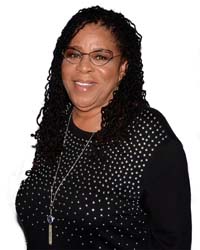 Susan Burton
Susan Burton
After Susan Burton’s five-year old son was accidentally hit and killed by a car, she numbed her grief through alcohol and drugs. As a result, she became trapped in the criminal justice system for nearly two decades before finding freedom and sobriety in 1997. Just one year later, Burton founded a nonprofit, dedicating her life to helping others break the cycle of incarceration. Susan Burton founded A New Way of Life Re-Entry Project (ANWOL) in 1998; starting with just one house in Los Angles, she initially found participants at the bus stop where former prisoners were released.
Click here to learn more
ANWOL now operates five residential homes and provides resources such as case management, employment and pro bono legal services. ANWOL has provided direct services to over 1,000 women, over 75% of whom stay drug free and out of prison. ANWOL empowers participants through advocacy, leadership and community organizing. Burton is co-founder of All of Us or None (AOUON) and the Formerly Incarcerated and Convicted People’s Movement (FICPM), both national grassroots civil rights movements comprised of formerly incarcerated individuals, their families, and community allies. In collaboration with UCLA’s Critical Race Studies Program, Burton launched the Employment Rights Re-Entry Legal Clinic which has grown to be the largest of its kind in Southern California. Susan Burton has earned numerous awards and honors, and is widely recognized as a leader in the criminal justice reform movement. She is a past Soros Justice Fellow, Women’s Policy Institute Fellow and Community Fellow under the California Wellness Foundation’s Violence Prevention Initiative. Burton has served on the state’s Little Hoover Commission and the Gender Responsive Strategies Task Force. For her work, Burton was named a CNN Top Ten Hero in 2010 and received the prestigious Citizen Activist Award from the Harvard Kennedy School of Government. In 2015 Burton was named by the Los Angeles Times as one of eighteen New Civil Rights Leaders in the nation. Her memoir Becoming Ms. Burton: From Prison to Recovery to Leading the Fight for Incarcerated Women was released in 2017.
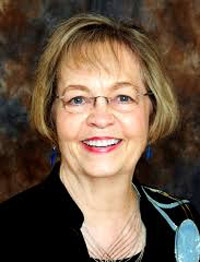 Margaret Dunkle
Margaret Dunkle
Margaret Dunkle played a key role in implementing Title IX, the law that transformed education for women and girls, from athletic fields to graduate schools. Her groundbreaking 1974 report documenting discrimination against female athletes became the blueprint for the Title IX regulations on athletics. Dunkle joined the Association of American College’s Project on the Status and Education of Women in 1972. Three years later, she became the first Chair of the National Coalition for Women and Girls in Education, which led the successful fight for strong Title IX rules.
Click here to learn more
In the 1980s, she documented widespread discrimination against pregnant and parenting students. As Director of the AAUW Educational Foundation, she commissioned the landmark 1992 study, How Schools Shortchange Girls. Dunkle conceived 1986 legislation that enabled low-income women to receive student aid without losing health insurance for their children. While President of the Federation of Organizations for Professional Women, she worked with Senator Edward Kennedy on the 1980 Science and Technology Equal Opportunities Act. Dunkle turned her focus to child development in the 2000s, when a family member was vaccine-injured, sustaining brain injury and developmental disabilities. She led successful 2007 efforts to require accurate developmental screening in Head Start programs and partnered with federal policymakers to ensure insurance reimbursement for such screenings. She recently retired after serving as Lead Research Scientist at George Washington University’s Department of Health Policy. She spearheaded 2015 efforts to honor forgotten civil rights heroine Harriet Elizabeth Brown. In 1937, Brown, represented by 29-year-old NAACP attorney Thurgood Marshall, successfully fought for equal pay for African-American teachers in rural Maryland. Dunkle’s Task Force implemented three recommendations: naming a community center and stretch of state highway in Brown’s honor and commissioning a courthouse portrait. Margaret Dunkle’s honors include induction into the Maryland Women’s Hall of Fame, and receiving the American Academy of Pediatrics’ Dale Richmond Award, Maryland’s William Donald Schaefer Helping People Award, First 5 Los Angeles’ Champion for Children Award, and Vice President Gore’s Hammer Award. Her papers are held at Harvard University’s Schlesinger Library.
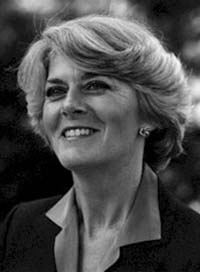
Geraldine Ferraro (1935-2011)
Geraldine Ferraro was the first female vice-presidential candidate representing a major political party. Suffering multiple election defeats, she went on to serve as U.S. Ambassador to the United Nations Commission on Human Rights. Geraldine Ferraro first ran for public office in 1978 and was elected to the U.S. House of Representatives where she served three terms representing the 9th district of New York. Ferraro quickly rose in her party’s hierarchy where she was twice elected Secretary of the House Democratic Caucus. In Congress she focused much of her energy on gender equity in wages, pensions, and retirement benefits.
Click here to learn more
As the 1984 presidential primary season drew to a close, women’s organizations including the National Organization for Women (NOW) and the National Women’s Political Caucus, put pressure on the frontrunner to select a woman for vice president. In July 1984 Walter Mondale announced his selection of Geraldine Ferraro as his running mate. She was both the first woman and first Italian American to run on a major party national ticket and her candidacy was celebrated by feminists and immigrant communities alike. Ferraro faced sexism on the campaign trail, reporters regularly asking if she was tough enough to serve as commander-in-chief. On November 6, 1984 Mondale and Ferraro lost the election. Despite the loss, Ferraro was seen as having a bright political future; she ran for Senate in 1992 and 98 but failed to advance past the Democratic primaries. In 1993 President Clinton appointed Ferraro U.S. Ambassador to the United Nations on Human Rights and in 95 appointed her Vice-Chair of the U.S. delegation to the Fourth World Conference on Women in Beijing. In both roles she served as an effective voice for women’s human rights around the world. Despite being diagnosed with multiple myeloma in 1998, Geraldine Ferraro remained politically active serving as a news commentator and working on the historic Hillary Clinton for president campaign in 2008.
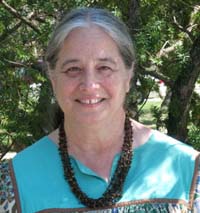
Jill Moss Greenberg
Jill Moss Greenberg is a lifelong crusader for fairness and the rights of underrepresented groups. She has been a trailblazer in addressing the intersection of women’s rights and history with issues of race, national origin, disability, religion, age, sexual orientation, gender identity, homelessness, and socioeconomic status. Jill Moss Greenberg started her activism and organizing at a young age. While still in college, she and a friend started one the nation’s first preschools for children with disabilities. She worked for many years in the civil rights and disability rights movements and applied those experiences to gender equality.
Click here to learn more
Moss Greenberg advocated tirelessly for the passage of Title IX (the federal regulation prohibiting gender discrimination in educational institutions) and assembled representatives of diverse women’s, civil rights and civic organizations to pilot the initial Title IX Institutional Self-Evaluation for public school systems. As the Race Equity Specialist at the Maryland State Department of Education, she initiated “Black History at Your Doorstep” and conducted weeklong, residential academies for school administrators. In 1980, while serving on the Maryland Commission for Women, she initiated the Maryland Women’s History Project, which expanded in 2010 to become the Maryland Women’s Heritage Center. Moss Greenberg served as the Founding Executive Director and coined the center’s mantra, “Adding Herstory to History to tell Ourstory.” Moss Greenberg has been a national leader in educational equity and multicultural education, serving as the first National Executive Director of NAME (the National Association for Multicultural Education). She served on the original Finance Committee of the National Women’s Political Caucus, and was a founder of the Maryland Women’s Political Caucus. She worked for the passage of the Maryland Equal Rights Amendment, with an Advisory Committee to the U.S. Commission on Civil Rights and with Coretta Scott King to create the national Martin Luther King, Jr. Holiday, and with the U.S. Congress in passing the Americans with Disabilities Act and the Helsinki Accords. Jill Moss Greenberg has received many honors for her work. She was inducted into the Maryland Women’s Hall of Fame in 1995.
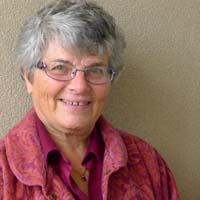
Roma Guy
Roma Guy is a social justice activist and policy leader on homelessness, public health, poverty, LGBTQI rights, immigrant rights, and women’s rights. She was a consultant and one of the LGBTQI activists featured in the 2017 ABC miniseries When We Rise. Roma Guy started her career in social work as a Peace Corps volunteer and training director in West Africa where she spent nine years working in literacy and health education. She and her partner of over three decades, Diane Jones, RN, have been engaged in activism for public health policy change at the local and national level for many decades.
Click here to learn more
Their focus areas include; protecting girls and women’s health, reproductive justice, HIV care, and universal health care. Over the years Guy was a co-founder of multiple groundbreaking organizations including: San Francisco Women Against Rape (1973, the city’s main rape crisis center), San Francisco Women’s Centers/the Women’s Building (1975/79, a nonprofit arts and education center), La Casa de las Madres (1976, the nation’s second domestic violence shelter), and the California Women’s Agenda (1995, which advocates for universal healthcare and reproductive justice). Guy also co-founded and served as Co-Director of the Women’s Foundation of California (1981-93), an organization that trains women as policy advocates and philanthropic leaders. In 1994 Guy joined the San Francisco State University as Director of the Bay Area Homelessness Program, a consortium of sixteen colleges working to end homelessness. She also served as a clinical faculty member in the Department of Health Education and School of Social Work for thirteen years. Guy has served on several boards and committees including the San Francisco Local Homelessness Coordinating Board (1994-2004), as a Health Commissioner for the city and county of San Francisco (1996-2007), and on the Jim Hormel Advisory Committee, helping to open a LGBT center at the San Francisco Public Library. Currently, she is a community organizer and policy advocate for Taxpayers for Public Safety and 2016-17 Co-Chair of the Jail Replacement Project in San Francisco. Roma Guy was nominated for the 2005 Nobel Peace Prize.
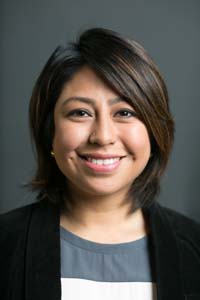
Cristina Jiménez
Cristina Jiménez is a leader in the youth-led immigrant rights movement and instrumental in creating the DACA program. By sharing her own story of being undocumented, Jiménez inspired others to come forward, and helped change the discourse on immigration. Cristina Jiménez is Executive Director & Co-founder of United We Dream (UWD), the largest immigrant youth-led organization in the country. Originally from Ecuador, Jiménez came to the U.S. with her family at the age of 13, attending high school and college as an undocumented student. She has been organizing in immigrant communities for over a decade and was part of UWD’s campaign team that led to the historic victory of the Deferred Action for Childhood Arrivals (DACA) program in 2012 that protected close to a million young immigrants from deportation.
Click here to learn more
Under Jiménez’s leadership UWD has grown to a powerful network of 55 affiliates in 26 states with over 400,000 members. In October of 2017, Jiménez was named a MacArthur Foundation Fellowship “Genius Grant” recipient. She has also been named to many prestigious lists including one of Forbes’s 2014 “30 under 30 in Law and Policy;” and one of the Chronicle of Philanthropy’s “40 under 40 Young Leaders Who are Solving Problems of Today and Tomorrow”. She was awarded an Honorary Doctorate Degree in Letters & Humanities by Wesleyan University. She has appeared in hundreds of media outlets including CNN, MSNBC, The New York Times, NPR, Univision, and Telemundo. She serves on the Board of Directors of the National Committee for Responsible Philanthropy (NCRP), Hazen Foundation, and Make the Road Action Fund. Cristina Jiménez co-founded the New York State Youth Leadership Council, the Dream Mentorship Program at Queens College, was an immigration policy analyst for the Drum Major Institute for Public Policy and an immigrant rights organizer at Make the Road New York. She holds a Masters degree in Public Administration & Public Policy from the School of Public of Affairs at Baruch College, CUNY and a B.A. in Political Science and Business from Queens College, CUNY.

Saru Jayaraman
Attorney Saru Jayaraman responded to the 9/11 tragedy by organizing displaced World Trade Center workers and co-founding ROC United. A national labor leader and researcher, she helps restaurant workers mobilize with employers and consumers for better wages and working conditions through policy change, workplace justice campaigns, cooperatively-owned restaurants, and more. Saru Jayaraman is the Co-Founder and President of the Restaurant Opportunities Centers United (ROC United) and Director of the Food Labor Research Center at University of California, Berkeley (the first food and labor academic research center nationwide).
Click here to learn more
After 9/11, together with displaced World Trade Center workers, she co-founded ROC, which now has more than 25,000 worker members, 300 employer partners, and several thousand consumer members in a dozen states nationwide. The story of Jayaraman and her co-founders’ work founding ROC has been chronicled in the book The Accidental American. ROC United is a leader in the ONE FAIR WAGE Campaign to end the two-tiered minimum wage system. The federal minimum wage for tipped workers remains only $2.13 per hour. Seven states, including California, have one minimum wage; ROC has demonstrated that these seven states are faring better than the 43 with lower wages for tipped workers. After moving about 200 high-profile restaurant companies to eliminate the lower wage for tipped workers in their restaurants, ROC is now advancing policy in other states to replicate the success of the original seven. ROC United is also a leader in conducting research on the restaurant industry; their findings detail pervasive wage theft, racial segregation and discrimination, and gender inequity. Jayaraman has authored two books; national bestseller Behind the Kitchen Door (Cornell University Press, 2013) and Forked: A New Standard for American Dining (Oxford University Press, 2016). Saru Jayaraman is a graduate of Yale Law School and the Harvard Kennedy School of Government. She has received numerous awards and recognitions including being listed in CNN’s “Top10 Visionary Women” (2014), recognized as a Champion of Change by the White House (2014), and she received a James Beard Foundation Leadership Award (2015).
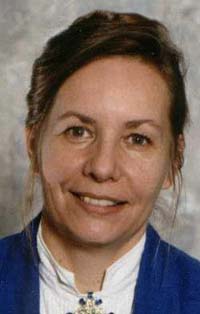
Marty Langelan
A leader in the global effort to end harassment and gender-based violence, Marty Langelan is called “the godmother of direct intervention.” She’s an economist, martial artist, past president of the DC Rape Crisis Center, and the author of Back Off: How to Confront and Stop Sexual Harassment. She’s been derailing harassers for decades. Langelan pioneered feminist self-defense training and bystander tactics, organized the first major city-wide anti-harassment campaign (1985-87), and conducted the first feminist survey on harassment. She recently designed the first effective harassment-prevention strategy for public bus/subway systems, training thousands of transit workers.
Click here to learn more
Her self-defense and anti-harassment programs are used worldwide. She’s taught hundreds of thousands of people how to interrupt sexist/racist behavior, reclaim jobs and neighborhoods from harassers, and shut down sexual predators. Langelan developed the Direct-Action Toolkit–more than 100 practical, principled ways to stop harassers in their tracks. Unlike legal/administrative remedies, direct-action works fast. These intervention tools are an efficient form of nonviolent civil disobedience, designed to disrupt the aggressor’s agenda. The direct-action techniques can even turn harassers into allies. Langelan provides violence-intervention skills for international human-rights organizations, anti-rape activists, environmentalists, and many others. She teaches kids how to stop bullies, and communities how to intervene to stop white-supremacist bigots. In 1971, she filed and won one of the earliest federal sex-discrimination actions, tackling the sexist disparity in graduate student funding. As a young government economist, she founded one of the first Federal Women’s Committees, making the Civil Aeronautics Board reallocate its training funds and open upward-mobility jobs. She handled discrimination cases for federal employees (and won the DOT Silver Medal for creating the national system to rate airlines’ on-time performance). As president of the National Woman’s Party (1999-2005), Langelan launched and led the massive preservation project to save Alice Paul’s headquarters in Washington, DC. She rescued the historic building, suffrage banners, and archives. A lifelong activist, Langelan committed her first act of feminist civil disobedience 60 years ago, when she catapulted 30 second-grade classmates into action to stop a teacher from brutally humiliating a child. Even seven-year-olds can do fast intervention.
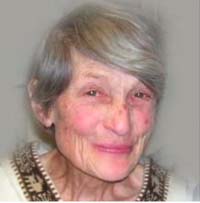
Pat Maginnis
Pat Maginnis was the first abortion activist in U.S. history. From distributing leaflets on a street corner to an illegal underground railroad of abortion services, she is an unsung hero in the fight for reproductive justice. Born in 1928, Pat Maginnis was inspired to fight for reproductive freedom while serving in an Army hospital in Panama where she witnessed horrible treatment of pregnant women. Upon returning stateside in 1959, she immediately went to work for abortion rights. Her first efforts were distributing mimeographed leaflets on street corners in the Bay Area, but she quickly took a more organized approach.
Click here to learn more
In 1962 Maginnis founded the Society for Humane Abortion (SHA) where she advocated for “elective abortion” and argued that all women had the right to safe and legal abortion. The organization sponsored symposia for medical and legal professionals, provided literature to libraries, family planning centers, and individuals, published a quarterly newsletter, and operated a free post-abortion clinic. In addition to her work with SHA, in 1966 Maginnis founded the Association to Repeal Abortion Laws (ARAL) to conduct unlawful underground activism. Known as the Army of Three, Maginnis and her colleagues Rowena Gurner and Lana Phelan conducted a systematic civil disobedience campaign at a time when even mailing literature about birth control was illegal. Through ARAL the Army of Three conducted self-abortion and contraception classes throughout the country. They coordinated an “underground railroad” linking over 12,000 American women with abortion clinics in Mexico. ARAL is considered a predecessor to NARAL Pro Choice America. The Army of Three and SHA disbanded in 1973 following Roe v. Wade, the U.S. Supreme Court Case legalizing abortion. Rowena Gurner and Lana Phelan have passed on, but at 89, Pat Maginnis remains active in her work for women’s reproductive rights as well as animal welfare. An avid political cartoonist for more than half a century, in 2015 she was honored by Northstate Women’s Health Network in conjunction with Women’s Health Specialists Feminist Health Centers with a solo retrospective exhibition of her selected works.
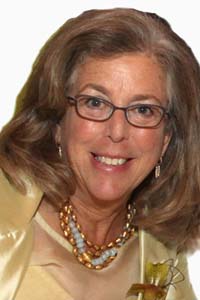
Arlene B. Mayerson
For over 35 years Arlene Mayerson has been a leading attorney in disability rights law, including playing a key role in drafting and negotiating the Americans with Disabilities Act (ADA) and amendments to the Individuals with Disabilities Education Act (IDEA), litigating precedent setting disability rights cases and teaching disability rights law. Arlene B. Mayerson has been Directing Attorney of the Disability Rights Education and Defense Fund since 1981. In addition to her behind the scenes role developing language for the provisions of the ADA and its legislative history, Mayerson provided expert testimony before several Congressional committees with jurisdiction over the ADA and filed comments on the Department of Justice ADA regulations for over 500 disability rights organizations.
Click here to learn more
Mayerson has also litigated historic disability rights cases, including precedent for the inclusion of public school children with disabilities in general education classrooms, and the landmark Netflix decision that internet-only businesses are covered by the ADA. She has also provided representation, consultation to counsel, and coordination of amicus briefs on key disability rights cases before the U.S. Supreme Court. Mayerson was appointed by the Secretary of the U.S. Department of Education to the Civil Rights Reviewing Authority, responsible for reviewing the civil rights decisions of the department. She is a John and Elizabeth Boalt lecturer in disability law at the University of California, Berkeley (Boalt Hall), and serves on the Advisory Committee of The Impact Fund. Her several awards and honors include the Spirit of Independence Leading Advocate Award from the Center for Independent Living (1993), the American Diabetes Association Public Policy Award (1997), the John and Elizabeth Boalt Lecturer Award (2013), the Henry Viscardi Achievement Award (2015), the Starkloff Disability Institute’s Open Door Award (2015), and the ABA Paul G. Hearne Award for Disability Rights (2016). She has published many articles on disability rights and is the author of a comprehensive three-volume treatise on the ADA: Americans with Disabilities Act Annotated-Legislative History, Regulations & Commentary (Clark Boardman Callaghan, 1994). Arlene Mayerson received her LL.M. from Georgetown University, J.D. from Boalt Hall, and B.S. from Boston University.

Pauli Murray (1910-1985)
Pauli Murray was a civil rights and women’s rights activist decades ahead of her time. Facing lifelong discrimination based on her race and sex, she persisted and became an accomplished attorney, author, activist, academic, and spiritual leader. Pauli Murray was extremely bright as a child, she finished first in her class at Howard Law School where she was the only female student. Despite her academic prowess, she was denied admission to UNC graduate school in 1938 due to her race and denied a fellowship to Harvard Law in 1944 due to her sex. She went on to be the first African-American awarded a law doctorate from Yale (1965) and later became the first African-American woman to be ordained an Episcopal priest (1977).
Click here to learn more
Murray was a critical figure in both the civil rights and women’s rights movements. In 1940, fifteen years before Rosa Parks, Murray was arrested for sitting in the whites only section of a Virginia bus. She coined the term “Jane Crow” referring to the intersecting discrimination faced by African American women and was highly critical of sexism within the civil rights movement. JFK appointed her to the Presidential Commission on the Status of Women (1961) and she was a co-founder of the National Organization for Women (NOW) in 1966. Many of Murray’s legal theories were decades ahead of their time and she is considered a pioneer of women’s employment rights. Her papers while a Howard law student arguing against segregation were used over a decade later in the landmark Brown v. Board of Education case (1955). Similarly, in the early 60s she argued that the 14th amendment forbade sex discrimination, a full ten years before the U.S. Supreme Court came to the same finding in Reed v. Reed (1971). Pauli Murray died in 1985. The Episcopal Church honored her as one of its Holy Women in 2012. In 2016 Yale University announced it would name a residential college after Murray, and that same year her family home in Durham, NC was designated a National Historic Landmark by the National Park Service.
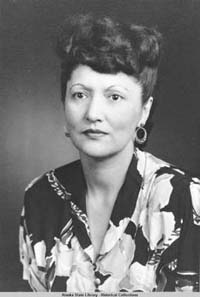
Elizabeth Peratrovich (Kaaxal.gat)(1911-1958)
An Alaska Native of the Tlingit nation, Elizabeth Peratrovich was a civil rights leader ahead of her time. Her activism led to passage of the Alaska Territory’s first anti-discrimination act (1945). Elizabeth Peratrovich grew up in a small Alaska village and was orphaned at a young age. She and her husband Roy, also of the Tlingit nation, had three children and moved to Juneau seeking more opportunities. During the 1940s Juneau was segregated; the Peratroviches, previously having lived in small mostly native towns, were shocked at the levels of discrimination.
Click here to learn more
Signs in shops and public facilities reading “No dogs or natives allowed” were all too common. Neighborhoods and schools were segregated and it was difficult for Alaska Natives to secure good jobs. As a leader of the Alaska Native Sisterhood she refused to tolerate the second-class treatment and petitioned the territorial governor to end segregation. An Anti-Discrimination Act failed to pass the Territorial Legislature in 1943. Peratrovich continued to lobby for civil rights and in 1945 the law again came for a vote. Peratrovich was the last to testify saying in part “I would not have expected that I, who am barely out of savagery, would have to remind gentlemen with five thousand years of recorded civilization behind them, of our Bill of Rights.” She eloquently spoke of the personal hardships experienced by her children and her community as a result of segregation. Her impassioned testimony and tireless lobbying efforts are credited with securing the legislation’s passage. On February 16, 1945 the Alaska Territory passed an anti-discrimination act to protect the civil rights of Alaska Natives. The law was the first of its kind nationwide and passed a full 19 years before the US Congress passed the Civil Rights Act of 1964. Elizabeth Peratrovich died of cancer in 1958. She has received numerous posthumous honors; In 1988 the Alaska Legislature declared February 16 as Elizabeth Peratrovich day, the Alaska Native Sisterhood established an award in her name, and in 1992 a gallery of the Alaska State Capitol was named in her honor.
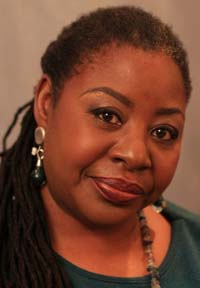
Loretta J. Ross
Loretta Ross has dedicated her career to feminist issues with a focus on women of color. She helped create the theory of Reproductive Justice, adding a human rights framework to include everyone in reproductive rights issues. Ross is a rape survivor and survivor of sterilization abuse. Loretta J. Ross launched her feminist career in the 1970s as director of the D.C. Rape Crisis Center, one of the first centers primarily run by and for women of color. She launched the Women of Color Program for the National Organization for Women (NOW) in the 1980s, and was national program director of the National Black Women’s Health Project.
Click here to learn more
She was the Program Research Director at the Center for Democratic Renewal/National Anti-Klan Network where she led projects researching hate groups, and working against all forms of bigotry. She founded and led the National Center for Human Rights Education (NCHRE) from 1996-2004. In 1994 Ross co-created the theory of Reproductive Justice. She was National Co-Director of the April 25, 2004 March for Women’s Lives in Washington D.C., the largest protest march in U.S. history at that time with 1.15 million participants. Ross was the National Coordinator of the SisterSong Women of Color Reproductive Justice Collective from 2005-2012 where she combined a self-help approach to internalized oppression with a human rights approach to structural inequity. Ms. Ross has appeared on numerous media outlets including CNN, BET, the New York Times, Time Magazine, The Los Angeles Times, and the Washington Post, among others. She co-authored Undivided Rights: Women of Color Organize for Reproductive Justice in 2004. She released two books in 2017, Radical Reproductive Justice and Reproductive Justice: An Introduction, co-written with Rickie Solinger. Her next book, Calling In the Calling Out Culture, is scheduled for publication in 2018. She is a Visiting Professor teaching courses on white supremacy, reproductive justice, and calling in practices at Hampshire College for the 2017-2018 academic year. Loretta Ross holds a B.A. from Agnes Scott College in Women’s Studies.
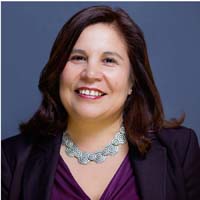
Angelica Salas
Angelia Salas is a key strategist and leader in the national movement for immigrant rights and policy reform. She works at the local, state, and national level to build coalitions among unions, faith groups, and students and seeks to give voice to the lives and experiences of individual immigrants. Salas is also working to recruit and train the next generation of activists. Since becoming Executive Director of the Center for Humane Immigrant Rights (CHIRLA) in 1999, Angelica Salas has spearheaded several ambitious campaigns locally, state-wide, and nationally.
Click here to learn more
She helped California become a pro-immigrant state by winning in-state tuition and financial aid for undocumented immigrant students and established day laborer job centers that have served as a model for the rest of the nation. She led efforts to allow all California drivers to obtain a driver license and is a leading spokesperson on federal immigration policy as an active member of FIRM (Fair Immigrant Rights Movement) and RIFA (Reform Immigration FOR America). Under Salas’s leadership, CHIRLA and its partners across the country have built the foundation for the upsurge in immigrant rights activism. As part of FIRM, Salas helped convene a coalition of organizations in California and across the country which have successfully mobilized millions of immigrants to demand comprehensive immigration reform including legalization with a path to citizenship, family reunification, and the protection of civil and labor rights. One of Salas’s greatest accomplishments at CHIRLA has been the transformation of a coalition of social service providers into an organization that empowers immigrants to engage in advocacy on their own behalf. In this respect, she has blazed a pioneering trail among immigrant coalitions around the country and has propelled other immigrant rights groups to follow her lead. She comes by her understanding of the immigrant experience firsthand. As a five-year-old, Angelica Salas came to the U.S. from Mexico to rejoin her parents who had come to the U.S. to find work and better provide for their family.
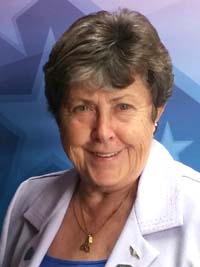
Linda Spoonster Schwartz
Linda Spoonster Schwartz overcame a military injury to become one of the nation’s leading veterans’ advocates, focusing especially on the unmet needs of women veterans. The Honorable Linda Spoonster Schwartz has served our country, since 1967, as an Air Force Nurse, veteran advocate and public servant. After 16 years of Military Service, she was medically retired after sustaining injuries in a 1983 aircraft accident, while serving as a USAF Flight Nurse. She looked to the Veterans Administration (VA) for help but found a pervasive attitude of neglect toward women veterans (inadequate facilities, lack of privacy, and physicals that didn’t include breast or gynecological exams).
Click here to learn more
Inspired to make a difference and impervious to her injuries, she earned a Master’s from Yale School of Nursing and Doctorate in Public Health from Yale School of Medicine. Schwartz has testified over 24 times on women veteran issues before both Houses of Congress. She spearheaded legislative efforts to authorize VA’s “Center for Women Veterans”. As Chair of VA’s Advisory Committee on Women Veterans, she emerged as a credible leader-champion for equal benefits, care, and services for women veterans. Schwartz served as Connecticut Commissioner/Commandant of Veterans Affairs (2003-2014) focusing on improving programs for women veterans, homeless veterans, and mental health services. In 2013, President Obama nominated her to be Assistant Secretary of Veteran Affairs for Policy and Planning where she continued to fight for issues such as veteran suicide prevention, and survivors of military sexual trauma. She has served on the National Boards of the American Nurses Association, Vietnam Veterans of America, and the Vietnam Women’s Memorial. She is the first and only woman elected President of the National Association of State Directors of Veteran Affairs. Among her many honors are being inducted into the American Academy of Nursing, National Commendation Medal of Vietnam Veterans of America for “Justice, Integrity, and Meaningful Achievement” and both the Ohio and Connecticut Veterans Hall of Fame. After leaving Federal Service, Dr. Schwartz returned to Connecticut where she has resumed many of her veteran advocacy activities.
 Susan Burton
Susan Burton Margaret Dunkle
Margaret Dunkle












